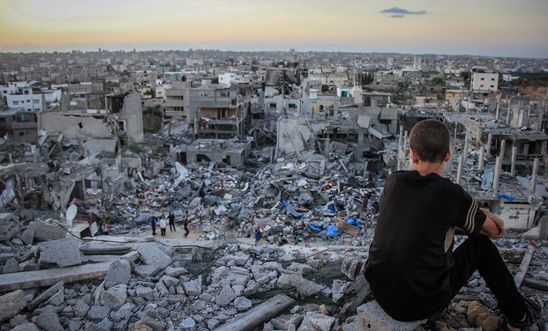
Press releases
Palestinian court move: UK should offer support and retaliations must stop

‘The UK and other EU countries should have the courage to support the Palestinians’ quest for justice’ - Allan Hogarth
Israel, the USA and EU member states must refrain from punishing or threatening Palestine for taking the positive step of granting the International Criminal Court jurisdiction over crimes under international law in the Occupied Palestinian Territories, Amnesty International has said.
Amnesty is concerned over punitive steps already taken by Israel over the ICC move, and is worried the USA and EU member states may do likewise. Influential EU member states, including the UK and France, had publicly opposed Palestine seeking access to the ICC.
On 1 January, a day after the Palestinian President Mahmoud Abbas signed the instrument of accession to the Rome Statute for the ICC, Israel suspended payment of some US$127 million in tax revenues due the Palestinian authorities. The move clearly punishes the entire civilian population, a population which in Gaza has already suffered the effects of a seven-year Israeli-imposed blockade and recurrent conflicts (see below).
Meanwhile, the USA may invoke a law passed by Congress in December requiring the government to stop its annual Economic Support Fund aid (amounting to $500 million) to the Palestinian authorities if “the Palestinians initiate an International Criminal Court judicially-authorised investigation … that subjects Israeli nationals to an investigation for alleged crimes against Palestinians.” If the USA follows through on this threat it would harm the civilian population in the Occupied Palestinian Territories, many of whom rely on this aid.
EU member states and Canada - ostensibly staunch supporters of the ICC - have pressured the Palestinian authorities not to take steps to grant ICC jurisdiction in recent years, including by issuing threats to withdraw financial assistance. The ICC move came the day after the UN Security Council rejected a draft resolution proposed by Jordan calling for an end to Israel’s occupation of the Occupied Palestinian Territories by the end of 2017. Eight countries voted in favour while the USA and Australia voted against. The UK, Rwanda, Nigeria, Lithuania and South Korea abstained.
Amnesty International UK’s Head of Policy and Government Affairs Allan Hogarth said:
“Rather than punishing an entire population by holding back tax payments, Israel should support a process that could lead to justice both for its own citizens as well as Palestinians.“International justice is for everyone and not just when it’s politically convenient, and the UK and other EU countries should have the courage to support the Palestinians’ quest for justice.”
Abbas signs up, Israel does not
Palestinian President Mahmoud Abbas signed an instrument of accession to the ICC on 31 December, and the next day Palestine also submitted a declaration to the ICC accepting retroactive jurisdiction from 13 June 2014 pursuant to Article 12(3) of the Rome Statute. These steps mean that crimes committed throughout the Occupied Palestinian Territories, including East Jerusalem, would be covered by the court’s jurisdiction, and alleged crimes during and after the conflict of last July and August could be investigated. On 6 January, the UN Secretary-General confirmed receipt of the submission from Palestine, which will join the ICC on 1 April. While Amnesty welcomes Palestine’s accession, it believes the additional declaration accepting ICC jurisdiction over crimes committed since 13 June last year is unnecessarily narrow and the organisation is calling on Palestine to reissue a declaration along the lines of its January 2009 one - which accepted the ICC’s jurisdiction over crimes committed on “the territory of Palestine since 1 July 2002”.
Israel participated in the negotiations leading to the ICC’s establishment in 2002, but in the same year it stated that it would not ratify the Rome Statute.
No justice and an ongoing blockade
During the 50-day conflict between Israel and Gaza last July and August, over 1,500 civilians - including more than 500 children in Gaza, and six civilians in Israel - were killed, while there was massive destruction and damage to civilian homes, businesses and infrastructure in Gaza. Both sides committed serious violations of international humanitarian law, including war crimes. Israeli forces carried out attacks on inhabited homes, in some cases killing entire families, and on medical facilities and schools, as well as deliberately destroying homes and civilian infrastructure. Hamas and Palestinian armed groups in Gaza fired thousands of indiscriminate rockets and mortar rounds into civilian areas of Israel.
The suffering for Palestinians in Gaza caused by last summer’s conflict is compounded by Israel’s ongoing blockade and the legacy of previous conflicts, which have had a devastating effect on the civilian population. Before the most recent conflict, Israeli restrictions on entry into Gaza of construction material meant that 75,000 housing units and 259 schools destroyed during previous conflicts had yet to be re-built. During last year’s conflict over 118,000 housing units were damaged or destroyed. At the end of November, the UN estimated that 19,600 families were displaced, many living in unsustainable conditions.
Israel has repeatedly denied access to Gaza to the UN Commission of Inquiry that was appointed by the UN Human Rights Council “to investigate all violations of international humanitarian law and international human rights law in the [Occupied Palestinian Territories] … in the context of the military operations conducted since 13 June 2014”. Further, it continues to deny access to Gaza to Amnesty and other international human rights organisations that are researching allegations of serious violations of international human rights and humanitarian law during the conflict. Over several decades, Amnesty and other human rights organisations have collected compelling evidence of war crimes and other crimes under international law committed by Israel, Hamas and Palestinian armed groups. However, perpetrators on both sides continue to enjoy impunity as both Israeli and Palestinian authorities have failed over many years to bring justice, truth and reparation to victims of crimes under international law.